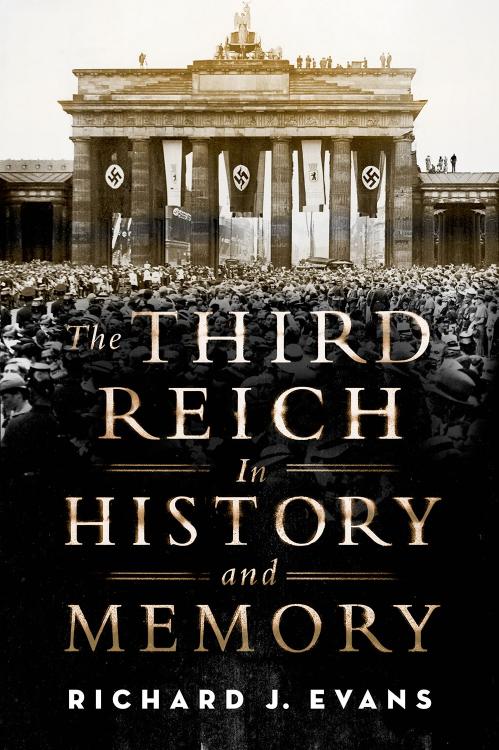The Third Reich in History and Memory by Richard J. Evans

Author:Richard J. Evans
Language: eng
Format: azw3, pdf, epub
ISBN: 9781408706435
Publisher: Hachette UK
Published: 2015-02-26T16:55:04.251000+00:00
16. TOWARDS WAR
âIt is with Hitler and Hitlerâs intentions,â remarks Zara Steiner at the beginning of her magisterial contribution to the Oxford History of Modern Europe series, The Triumph of the Dark: European International History 1933â1939 (2011), âthat any student of European international history must start.â From the moment he became Chancellor, Hitler acted and other statesmen reacted.
His intentions were fixed long before he came to power. They were breathtaking in their ambition. Hitler was not a conventional European statesman. Governed by a Social Darwinist belief in international affairs as a perpetual struggle between races for survival and supremacy, Hitler repeatedly told his leading military and naval officers that Germany would conquer Eastern Europe, aggrandising its vast agricultural resources for itself and pushing aside those who lived there to make way for the expansion of the German raceâs âliving spaceâ. France, Germanyâs traditional enemy in the west, would be subjugated to allow Germany to become Europeâs dominant nation. This was not a normal German foreign policy in any sense; nor was it determined by the structural factors inherent in the international system of Europe since the nineteenth century, as some have argued.
Of course, Steiner concedes, Nazi Germany was not controlled by a monolithic policy-making structure, and different groups and individuals in the higher echelons of the regime often pursued their own agendas. This was particularly the case with Joachim von Ribbentrop, who graduated from being head of the Nazi Partyâs foreign affairs bureau to being the ambassador in England and then Foreign Minister. âVain, aggressive, and self-importantâ, in Steinerâs words, Ribbentrop developed a rabid Anglophobia and did his best to dissuade Hitler from pursuing the idea of an Anglo-German alliance. Britain, he said, was âour most dangerous enemyâ. Fuelled by perceived slights during his time in London, where his tactlessness earned him repeated and increasingly outspoken criticism in the press, the Foreign Minister eventually succeeded in weaning Hitler away from the alliance project. The Nazi leader continued to hope for British neutrality in the coming conflict, however.
Others, such as Hermann Göring, also on occasion ploughed their own furrow, or influenced Hitler in one direction or another. Yet in the end, it was Hitler â rather than an ill-defined âpolycracyâ â who determined Germanyâs foreign policy. âWhether Germany was led by Bismarck, Wilhelm II, or Hitler made a vital difference to its policies,â Steiner observes. Germany, Hitler declared in Mein Kampf, would âeither be a world power, or cease to be.â Once hegemony had been achieved in Europe, so Hitler adumbrated in his Second Book, Germany would enter into a power struggle with America for world domination. In order to achieve this, Germans, equated by Hitler with the âAryanâ race, would have to deal with their arch-enemies the Jews, whom Hitlerâs paranoid political fantasies portrayed as engaged in a global conspiracy to subvert German civilisation.
Increasingly, Hitler came to identify America as the epicentre of this supposed conspiracy, with Jewish capital working through US President Franklin D. Roosevelt. All of this would
Download
The Third Reich in History and Memory by Richard J. Evans.pdf
The Third Reich in History and Memory by Richard J. Evans.epub
This site does not store any files on its server. We only index and link to content provided by other sites. Please contact the content providers to delete copyright contents if any and email us, we'll remove relevant links or contents immediately.
| Africa | Americas |
| Arctic & Antarctica | Asia |
| Australia & Oceania | Europe |
| Middle East | Russia |
| United States | World |
| Ancient Civilizations | Military |
| Historical Study & Educational Resources |
Magic and Divination in Early Islam by Emilie Savage-Smith;(1533)
Papillon by Henry Charrière(1432)
Bohemians, Bootleggers, Flappers, and Swells: The Best of Early Vanity Fair by Bohemians Bootleggers Flappers & Swells- The Best of Early Vanity Fair (epub)(1409)
Ambition and Desire: The Dangerous Life of Josephine Bonaparte by Kate Williams(1389)
Twelve Caesars by Mary Beard(1315)
What Really Happened: The Death of Hitler by Robert J. Hutchinson(1163)
Operation Vengeance: The Astonishing Aerial Ambush That Changed World War II by Dan Hampton(1162)
London in the Twentieth Century by Jerry White(1147)
The Japanese by Christopher Harding(1133)
Time of the Magicians by Wolfram Eilenberger(1126)
Twilight of the Gods by Ian W. Toll(1120)
Lenin: A Biography by Robert Service(1076)
The Devil You Know by Charles M. Blow(1024)
A Social History of the Media by Peter Burke & Peter Burke(976)
Freemasons for Dummies by Hodapp Christopher;(964)
Napolean Hill Collection by Napoleon Hill(943)
Henry III by David Carpenter;(919)
The Rise and Triumph of the Modern Self by Unknown(913)
Richard III (The English Monarchs Series) by Charles Ross(908)
